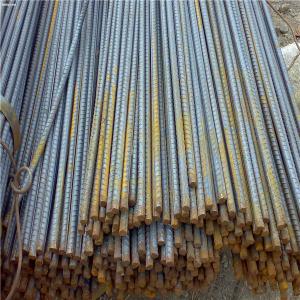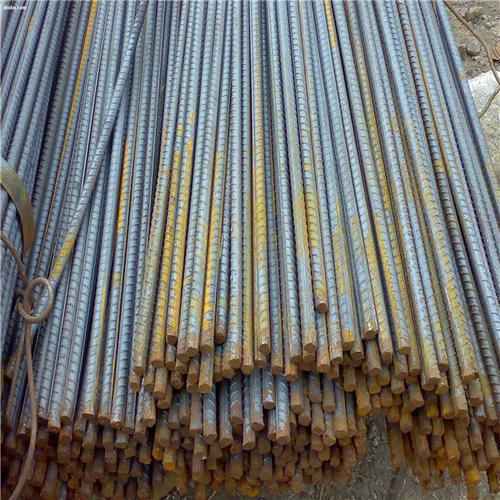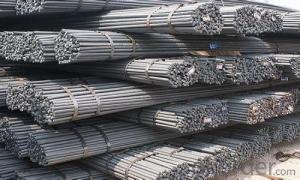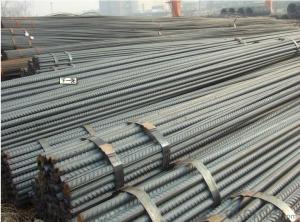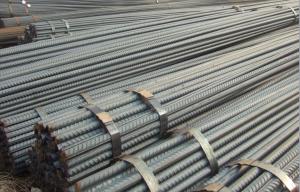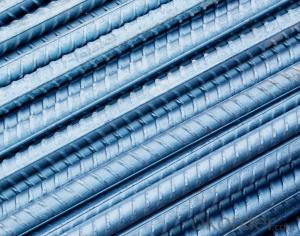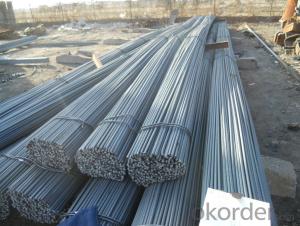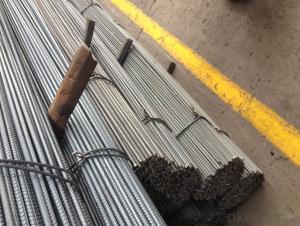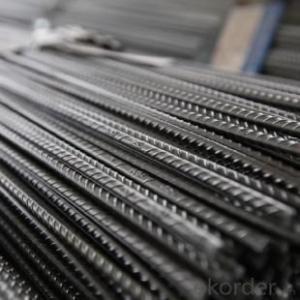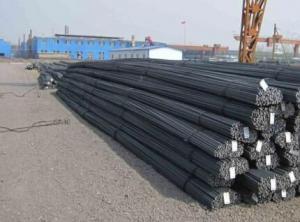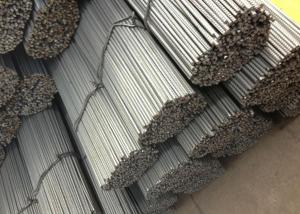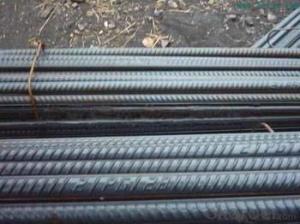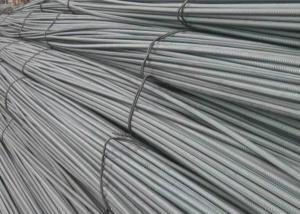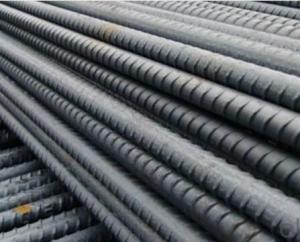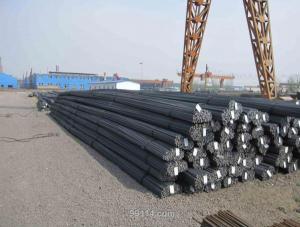Deformed steel bar 6-40 MM HRB 400 HRB 500
- Loading Port:
- Qingdao
- Payment Terms:
- TT OR LC
- Min Order Qty:
- 600 m.t.
- Supply Capability:
- 19452 m.t./month
OKorder Service Pledge
OKorder Financial Service
You Might Also Like
Specification
Rebar is common steel reinforcing bar, an important component of reinforced concrete and reinforced masonry structures.
It is usually formed from mild steel, and is given ridges for better frictional adhesion to the concrete.
To prevent such a failure, rebar is either deeply embedded into adjacent structural members, or bent and hooked at the ends
to lock it around the concrete and other rebars. This first approach increases the friction locking the bar into place while the
second makes use of the high compressive strength of concrete.
Most grades of steel used in rebar cannot accept welding; such as, to adjacent steel plates or as means to bind single pieces
of rebar together. However, special grades of rebar steel and welding rods make welding by expert welders possible.
Our Advantage:
High quality steel products from 1 class mills in China
Reasonable price
Professionalism of the products
On-time delivery
Complete documents and certificates
Sincere service to meet our clients' requirements
Product Description :
Chemical composition (%): | Steel | C | Si | Mn | P | S | Ceq | ||||
HRB335 |
0.25 |
0.80 |
1.60 |
0.045 |
0.045 | 0.52 | |||||
HRB400 | 0.54 | ||||||||||
HRB500 | 0.55 | ||||||||||
Mechanical properties | Steel | Rel/ MPa | Rm/ MPa | A/ % | Agt/ % | ||||||
≥ | |||||||||||
HRB335 | 335 | 455 | 17 |
7.5 | |||||||
HRB400 | 400 | 540 | 16 | ||||||||
HRB500 | 500 | 630 | 15 | ||||||||
Package: | Standard export packing or as customer's request | ||||||||||
Application: | Construction, building, bridge, road. ect | ||||||||||
Payment terms | 1).100% irrevocable L/C at sight. | ||||||||||
Delivery time | 15-30 days after receipt of L/C or deposit by T/T | ||||||||||
Features
1、Pure steel quality, stable chemical contents, small tolerance.
2、Constant Quality, good drawing performance.
3、High dimension accuracy degree, accuracy degree of Level C up to 80%, smooth surface, less scale, easy to be pickled.
4、Automatic bundling with 4 lines by Machine in tidy and good looks
5、Big high quality percentage, small coil percentage, and heavy coil weight for Hard Coil.
6、High sorbitizing percentage.
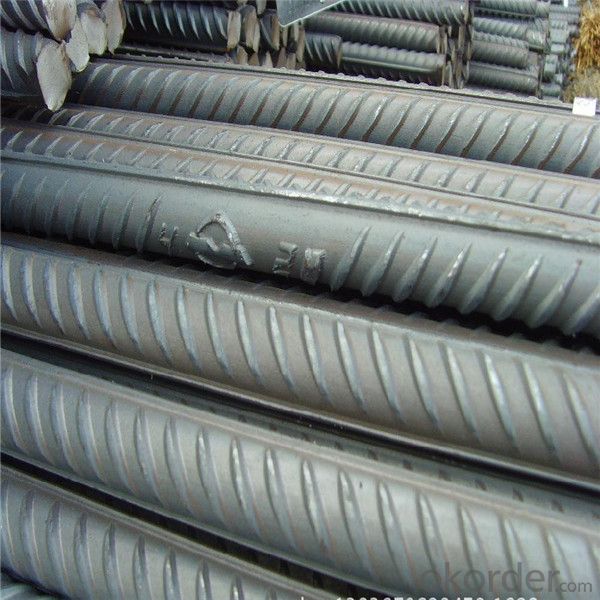
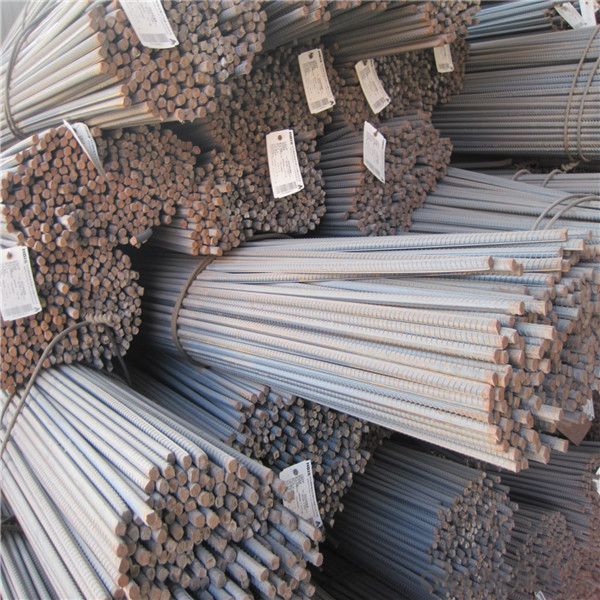
Packing:
In bundles, each bundle weight 3.5 tons. Load by container or by bulk verssel.
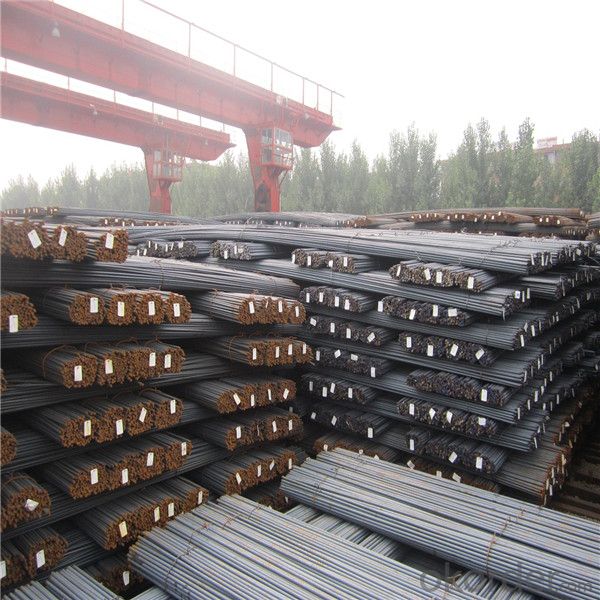
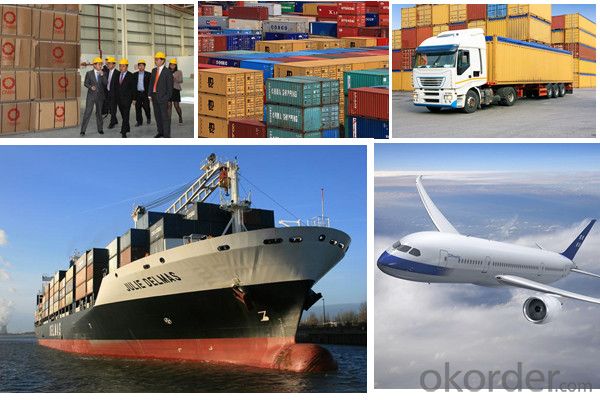
Our service
(1) We cooperate with famous factories with advanced equipment and well trained workers.
(2) We can provide factory price with trading company service.
(3) We continuously work on the improvement of our processes, guaranteeing consistently high standards
of quality to keep none compensation.
(4) We guarantee 24 hours response and 48 hours solution providing service.
(5) We accept small order quantity before formal cooperation.
(6) We deliver the agreed quality at the agreed time, reacting to changes in customer wishes in a flexible way.
(7) Due to our volume and selling power, we have excellent freight rates with shipping lines.
(8) We strive to always be fair and honest in our dealings with customers.
(9) We strive to work together with customers to achieve much more than we can achieve alone.
(10) Through our passion and commitment we aim to be a market leader in all our key markets. To maintain
our position as market leader we must continue to add value in all that we do.
FAQ:
1.Q: What's your MOQ(minimum order quantity)?
A: One full container, mixed acceptable .
2. Q: What's your packing methods?
A: Packed in bundle or bulk ..
3. Q: How can I buy CNBM products in my country?
A:Please send us an inquiry or email ,we will reply to you if there is distributor in your country
4. Q: Can we visit your factory?
A: Warmly welcome. Once we have your schedule, we will arrange the professional sales team to follow up your case.
5. Q: How long does it take to get the product if i place an order?
A:With the process of your requirements,we will pack and deliver in 3-7 days. If it is by sea shipment,it will take 15-45 days depending on different locations
- Q: What are the alternatives to steel rebars in construction?
- Some alternatives to steel rebars in construction include fiber-reinforced polymer (FRP) rebars, carbon fiber-reinforced polymer (CFRP) rebars, and glass fiber-reinforced polymer (GFRP) rebars. These materials offer similar strength and durability to steel rebars while also providing benefits such as corrosion resistance, lighter weight, and ease of installation. Additionally, materials like bamboo, timber, and basalt rebars are being explored as sustainable alternatives to steel rebars in certain construction projects.
- Q: What is the role of steel rebars in preventing concrete spalling due to fire?
- Steel rebars play a crucial role in preventing concrete spalling due to fire by providing reinforcement and structural integrity to the concrete. When exposed to high temperatures during a fire, concrete can undergo thermal expansion, which can lead to cracking and spalling. However, the presence of steel rebars helps to restrain the expansion and prevent the concrete from breaking apart. The rebars act as a reinforcement, distributing the stresses caused by the heat and preventing the concrete from failing under the extreme conditions. Overall, steel rebars enhance the fire resistance of concrete structures and help maintain their structural integrity during a fire event.
- Q: How do steel rebars affect the flexibility of concrete structures?
- Steel rebars play a critical role in enhancing the flexibility and overall strength of concrete structures. When incorporated into concrete, rebars offer essential tensile strength to resist bending and stretching forces that can lead to cracks or failure in the structure. Concrete possesses strength in compression but lacks it in tension. This means that it can bear substantial weight pushing down on it, but it is susceptible to cracking or breaking when subjected to pulling or stretching forces. By integrating steel rebars into the concrete, its tensile strength increases significantly, enabling it to better withstand these tension forces. The inclusion of rebars in concrete structures allows for the more even and efficient distribution of loads. When exposed to external forces like wind, earthquakes, or heavy loads, the rebars assist in dispersing stress throughout the concrete, preventing concentrated stress points and reducing the risk of structural failure. Moreover, steel rebars also enhance the flexibility of concrete structures. By providing additional support and reinforcement, rebars enable the concrete to bend and flex to a certain degree. This flexibility is particularly crucial in areas prone to seismic activity or excessive vibrations. Flexibility in concrete structures is vital as it permits the building to absorb and dissipate energy during earthquakes or other dynamic forces. Without the presence of rebars, concrete structures would be more rigid and susceptible to cracking or collapsing under such conditions. In conclusion, steel rebars significantly enhance the flexibility and overall performance of concrete structures. By offering the necessary tensile strength and reinforcement, they enable the concrete to better withstand bending, stretching, and external forces, thereby reducing the risk of structural failure and ensuring the construction's durability and longevity.
- Q: What are the factors that can cause corrosion in steel rebars?
- The corrosion of steel rebars can be influenced by several factors. Firstly, the exposure to moisture and oxygen is a significant contributor to the corrosion process. When the steel rebar's surface comes into contact with moisture, it triggers an electrochemical reaction with the oxygen in the air, resulting in the formation of rust. This reaction is sped up in environments with high humidity or continuous water exposure, like coastal areas or submerged structures. Another factor that can cause corrosion is the presence of chloride ions. These can be found in seawater, deicing salts, or industrial environments, and they can penetrate the protective oxide layer on the steel rebar, making it more susceptible to corrosion. Once the chloride ions reach the metal surface, they break down the passive film, which allows the corrosion process to happen more quickly. The pH level of the environment is also crucial. Steel rebars are more prone to corrosion in highly acidic or alkaline conditions. Acidic environments, such as those in industrial areas with high air pollution or chemical exposure, can corrode the steel rapidly. Conversely, alkaline conditions, often found in concrete structures due to the presence of cement, can create a highly alkaline environment on the rebar's surface, leading to the breakdown of the protective oxide layer and promoting corrosion. Additionally, the presence of other impurities or contaminants can accelerate the corrosion process. For example, sulfur compounds can react with the steel rebar, forming sulfide corrosion products that weaken the structure. Similarly, exposure to certain organic compounds or acids can also contribute to corrosion. Lastly, the design and maintenance of structures can also play a role in the corrosion of steel rebars. Inadequate concrete cover or poor quality concrete can make it easier for moisture and oxygen to reach the steel, increasing the chances of corrosion. Lack of proper maintenance, such as neglecting to repair cracked or damaged concrete, can also lead to water infiltration and subsequent corrosion of the rebars. In conclusion, factors like moisture and oxygen exposure, chloride ions, pH level, presence of contaminants, and insufficient design or maintenance can all contribute to the corrosion of steel rebars. It is vital to understand and address these factors to ensure the longevity and durability of structures that incorporate steel rebars.
- Q: How are steel rebars connected to each other in construction?
- Steel rebars are typically connected to each other in construction through various methods such as overlapping, welding, or using mechanical connectors like couplers. These connections are crucial for reinforcing concrete structures and ensuring their strength and durability.
- Q: How do steel rebars contribute to the overall structural stability of a building?
- Steel rebars contribute to the overall structural stability of a building by providing reinforcement to concrete structures. They enhance the tensile strength of concrete, which is otherwise weak in resisting tension forces. By distributing the load and absorbing the stress, rebars prevent cracks and failure in concrete, making the building more resistant to various forces such as earthquakes, wind, and heavy loads, ensuring its overall stability and longevity.
- Q: What are the different methods of joining steel rebars?
- There is a range of methods available for joining steel rebars, each with its own set of advantages and disadvantages. Here, we present the most common techniques: 1. Lap Splicing: The most widely used method for joining rebars is lap splicing. It entails overlapping two rebars and securing them together with wire or metal ties. This approach is cost-effective and straightforward, but it necessitates longer lap lengths to achieve the required strength. 2. Mechanical Splicing: Mechanical splicing involves connecting rebars using mechanical couplers or splices. These couplers are specifically designed to establish a strong and dependable connection between the rebars. Mechanical splicing enables quicker installation and reduces the need for lengthy overlaps. However, it may be more costly compared to lap splicing. 3. Welding: Another option for joining steel rebars is welding. This process involves heating the rebars and fusing them together using electric arcs or gas flames. Welding creates a robust and permanent connection, but it requires skilled labor and specialized equipment. It is commonly employed in precast concrete applications. 4. Bolted Connections: Bolted connections utilize bolts and nuts to join the rebars. This method offers a flexible and adjustable connection, making it suitable for certain applications. However, bolted connections necessitate additional hardware and may not be as strong as other methods. 5. Adhesive Bonding: Adhesive bonding involves using epoxy or other adhesives to join rebars. The adhesive is applied to the rebars, and they are pressed together until the adhesive cures and forms a strong bond. Adhesive bonding provides a clean and aesthetically pleasing finish, but it may not offer the same level of strength as other methods and is more suitable for non-structural applications. It is essential to consider factors such as specific project requirements, structural design, and construction techniques when selecting a joining method. Consulting with structural engineers and adhering to industry standards and codes is crucial to ensure the appropriate selection and implementation of the joining method for steel rebars.
- Q: What are the different types of steel rebars used in column reinforcement?
- There are several types of steel rebars used in column reinforcement, including mild steel rebars, high-strength rebars, epoxy-coated rebars, and stainless steel rebars.
- Q: How do steel rebars enhance the load-bearing capacity of a structure?
- Steel rebars serve to enhance the load-bearing capacity of a structure by reinforcing and strengthening the concrete. Essentially, they are embedded within the concrete, acting as a skeleton or framework that provides additional strength to the structure. The main purpose of steel rebars is to withstand tension forces that the concrete alone may not be able to withstand. When a structure is subjected to heavy loads or external forces, such as earthquakes or wind, the concrete may crack or fail under the stress. However, the steel rebars help distribute and absorb these forces, preventing the concrete from breaking apart. The ribbed surface of the rebars improves the bond between the steel and the concrete, ensuring effective transfer of loads between the two materials. This bond allows the rebars to resist tension and compression forces, as well as shear forces, resulting in an overall increase in load-bearing capacity. Moreover, steel rebars help control and limit the width and depth of cracks that may occur in the concrete. By restraining crack propagation, rebars prevent the cracks from expanding and compromising the structural integrity of the building. This is particularly crucial in earthquake-prone regions, where a structure's ability to withstand ground movements is of utmost importance. Additionally, steel rebars contribute to the durability and longevity of a structure. They possess high tensile strength, enabling them to withstand significant pulling forces without deforming or breaking. This property ensures that the structure remains stable and secure over time, even under dynamic or extreme loading conditions. In conclusion, steel rebars play a vital role in enhancing the load-bearing capacity of a structure by reinforcing the concrete, increasing its resistance to tension forces, and controlling crack propagation. Their presence significantly improves the structural integrity, durability, and safety of buildings, making them an indispensable component in modern construction practices.
- Q: What are the different shapes and forms of steel rebars available?
- There are several different shapes and forms of steel rebars available, each designed for specific applications and requirements in construction projects. 1. Plain round bars: These are the most common type of steel rebars and have a circular cross-section. They are used in a wide range of applications, including general construction, reinforcement in concrete slabs, and foundation works. 2. Deformed bars: These rebars have protrusions or deformations on their surface to provide better adhesion with concrete. The deformations increase the bond strength between the rebar and the concrete, making them suitable for applications that require high tensile strength, such as columns, beams, and retaining walls. 3. Square bars: As the name suggests, square rebars have a square cross-section. They are commonly used in applications where a strong bond with concrete is required, such as in precast concrete elements, footings, and walls. 4. Rectangular bars: Rectangular rebars have a rectangular cross-section and are often used in applications that require higher tensile strength, such as bridges, tunnels, and heavy structural elements. 5. Welded wire fabric (WWF): WWF is a prefabricated reinforcement material that consists of a series of longitudinal and transverse wires welded together to form a grid-like pattern. It is commonly used in slabs, walls, and pavements, providing uniform reinforcement distribution. 6. Dowel bars: Dowel bars are used to transfer loads between two adjacent concrete elements, such as connecting slabs or pavements. They are typically made of smooth round bars and are inserted into drilled holes with epoxy adhesive for improved load transfer. 7. T-shaped bars: T-shaped rebars have a T-like cross-section, with a stem and a flange. They are commonly used in applications where additional reinforcement is needed at specific locations, such as joints, corners, and connections. It is important to consider the specific requirements of the construction project and consult with structural engineers or professionals to determine the appropriate shape and form of steel rebars to ensure optimal reinforcement and structural integrity.
Send your message to us
Deformed steel bar 6-40 MM HRB 400 HRB 500
- Loading Port:
- Qingdao
- Payment Terms:
- TT OR LC
- Min Order Qty:
- 600 m.t.
- Supply Capability:
- 19452 m.t./month
OKorder Service Pledge
OKorder Financial Service
Similar products
Hot products
Hot Searches
Related keywords
